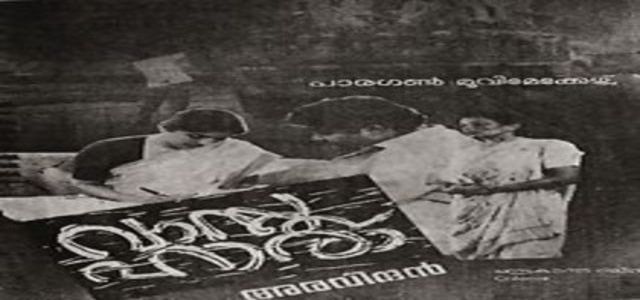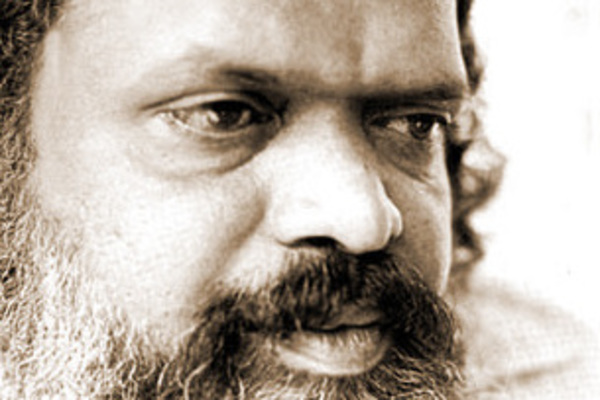05/10/2016
When Rita Hemrajani made her engaging documentary titled Train Within 24 Frames in 2013, garnering a fair share of praise from film lovers and train enthusiasts alike, she might not have known that there have been images of trains far more resonant, arresting and disturbing beyond the ken of her work which quite predictably follows the trail of Bollywood's romance with the Indian Railways.
Of course there is the customary train visual from Pather Panchali, but that is just about it. She should have watched Vasthuhara (1991) and seen how G. Aravindan transforms the deserted work yards of railway stations, wagons overrun with wild vegetation, and ruins of derelict, abandoned coaches into stirring testimonies of the ravages and traumas of history. Of betrayal, loss, poverty, isolation, banishment, dislocation, humiliation, blood, tears and hunger. The film begins with the familiar visuals of chugging trains bursting with the weight of refugees and ends with the siren of the ship of refugees signifying the human being as the eternally migrating animal, forced by the pitiless cycles of war, power and greed.
This insight into the ceaseless movement of life enters vitally into the remarkable soundscape of the film -- a soundscape thick with the buzz of vehicles, racing engines, blaring horns. Aravindan tries to capture the music of the city in the drone of its engines and whirr of its wheels. From the bullock cart in Venu's village to the train, the tram and the ship, the narrative foregrounds the noise of human traffic. Venu's voiceover too is one of its kind - it is an introspective, reflective voice not an objective, superior comment on the larger events; an observer's humble whisper, a gentle inner murmur as incidents march on. His voice enunciating the lines from Sreeraman's text becomes curiously a part of the soundscape of the film -- merging into the buzz of the city very often.
I saw Vasthuhara first in 1991 and have been in love with it ever since. It is a Malayalam/Bengali film set largely in Calcutta against the backdrop of partition. A film I go back to for emotional sustenance and rejuvenation. Because pain and hope are its warp and woof, and it affirms faith in some vague sense of human goodness despite the relentless tragedies. Drawing upon C.V. Sreeraman's compelling short story, Aravindan breathes a bewildered anguish into each frame. Although Mohanlal as the refugee officer Venu from the Andamans becomes the voice and perspective of the film, I prefer to see Arathi Panicker ( Neelanjana Mitra) as the center of this rare narrative of stoicism, courage and straight backed dignity. As a Bengali woman married to a Malayalee revolutionary, she epitomizes the struggle and the indomitable will to survive. Her austere appearance and frugal bearing is softly offset by her daughter Damayanti's obdurate revolutionary fervor, contempt for Malayalee opportunism, impulsive anger and self-righteous naiveté . Only Nina Gupta can make those words sound so achingly vulnerable, "I will work only in a liberated India." The drab lives of refugees contrast with the vivid greenery of Venu's tharavadu, its churlish inmates and their xenophobic anger that kept Arathi and her children away from their rightful home. The ironies of Malayalee respectability and revolutionary spirit are artfully built into the frames most unsurprisingly by the man who shaped the large worlds of small mortals. It is curious how the 'beef-eating, cigarette-smoking Bhavani Ammayi" of Venu's mother's imagination in the story transforms into a middle aged, dignified woman in the film (Padmini) ready to forfeit her land to Arathi. Complexities and nuances of human relationships, passions and bonds wound you with their piercing understatements. Venu slides between his past and the present through a process of editing that invokes a distinct perception of time and memory.
"Subtlety is my style"-- these words of Aravindan are literally embodied in Venu's unobtrusive presence in the narrative. It is astonishing to see the superstar diminishing into anonymity through his withdrawn body language and voice. As Venu tries to grapple with the discovery of his long lost aunt and cousin in the city of Calcutta, with a million expressions flitting across his face emoting a mixture of disbelief, wonder, amazement and recognition in a couple of seconds, we witness some of the finest moments in the saga of acting in Malayalam cinema. A Mohanlal who expresses himself the best in total silence. Because, thankfully, there are still moments beyond words in life and in cinema.
It is a short story with an epic sweep, and Aravindan's eye senses its cinematic possibilities with his characteristic artistic intuition. Infidelity to the literary text is at the heart of the film's creative beauty and force. Aravindan takes delicious liberty with the text and offers a most memorable sequence where Venu is taken by Damayanti to meet her brother who is underground. The young Bengali teenager hugging his paternal cousin from a father's home in faraway Kerala, of which he has only heard of, throws up contradictions, longings and bonds yet to be explained or understood. Aravindan was a bard of the unutterable, the unsaid and the unfinished. A smile, a look, a slight nod throbbed with the ambiguities of the moment. Sunny Joseph's camera leaves you choking with some unforgettable shots like that of Arathi and Damayanti in a huddle on the shore as Venu looks on helplessly from the moving ship; two women dwindling into just two specks on the receding horizon.
Today when war knocks at our doorsteps and the empty cries of heroism and valor make a mockery of our democratic peace loving credentials, when there are more migrants than citizens, when refugees are a growing number, we need to see how violence and partition have marred our destinies for generations. Scars are for many births, but Vasthuhara, or the dispossessed, amaze us with their one precious possession -- the capacity to love .The film is at once a lament and a celebration. It is an ode to the resilience of love. Although as Venu wistfully murmurs to Damayanti -- words of love are always reactionary.
(This is the eighth article in a series that aims to remind readers about some important Malayalam films.)


